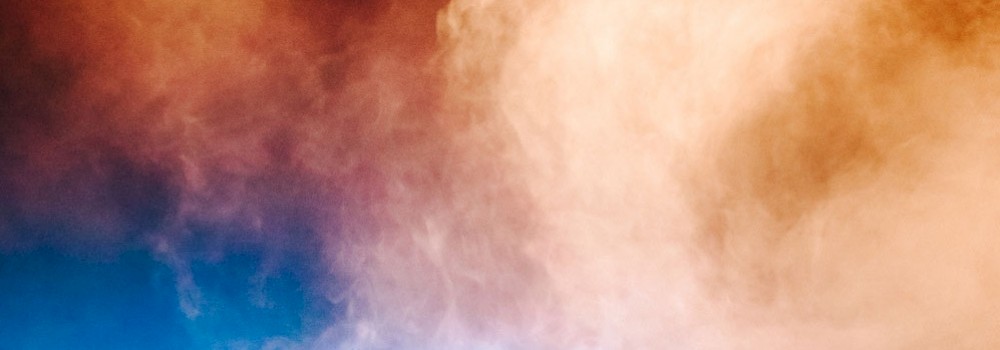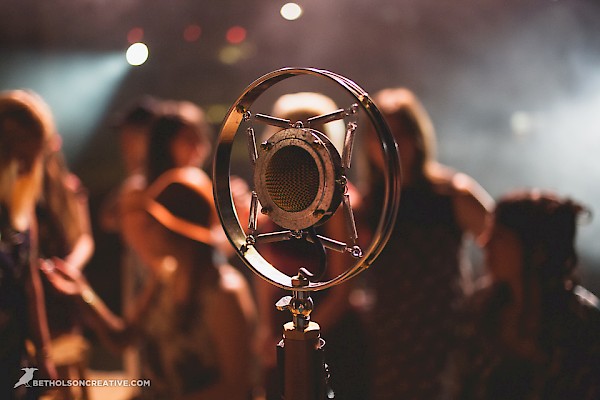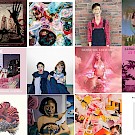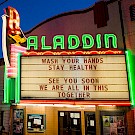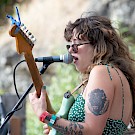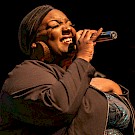Twenty women gathered onstage.
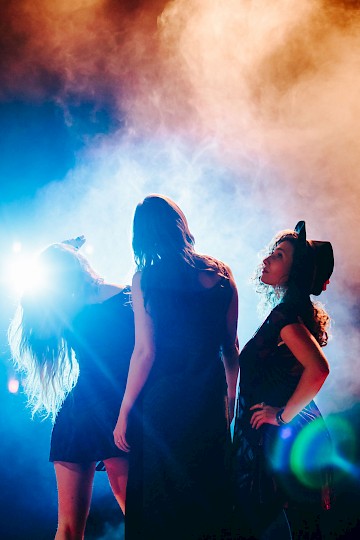 Sisters in Song: Sara Jackson-Holman, Sarah Fennell and Moorea Masa embody The Three Graces: Photo by Jason QuigleyTwenty female musicians, singers and writers, assembled onstage like a choir standing in a crescent moon half-circle, but there was no music and no singing. They were here in the name of fashion. Prêt-à-porter, Portland-style. They were called on as the bold, the brave and the beautiful. And everything was coming up threes.
Sisters in Song: Sara Jackson-Holman, Sarah Fennell and Moorea Masa embody The Three Graces: Photo by Jason QuigleyTwenty female musicians, singers and writers, assembled onstage like a choir standing in a crescent moon half-circle, but there was no music and no singing. They were here in the name of fashion. Prêt-à-porter, Portland-style. They were called on as the bold, the brave and the beautiful. And everything was coming up threes.
This was the culmination of The Greenroom Collection: a three-part lookbook project featuring women in Portland music. The ladies in the limelight and under the stage lights of the Aladdin Theater for this final photoshoot are part of a powerful triumvirate as timeless as the Triple Goddess and the three muses themselves—represented here as women, music and fashion.
If that all sounds a little mythological and witchy, there’s a reason for referencing the feminine divine.
The Greenroom Collection is the starry-eyed, rock star dream child of Cassie Ridgway, owner of Altar (a handmade fashion boutique with “an edgy, dark bohemian aesthetic”) and member of the band Fault Lines. As a successful woman in two creative businesses for more than four years, Ridgway is exploring the overlap between her endeavors in designing and manufacturing clothing and making music.
Altar is situated on Hawthorne’s commercial corridor in SE Portland and features the Altar Houseline, a collection of small-production garments with striking prints and clean, feminine lines, all envisioned and sewn in the space above the shop. Paired with the house jewelry line, Iron Oxide Designs (crafted by Ridgway’s business partner Amy Fox), Ridgway recently honed her vision, teamed up with Fox, and rebranded the shop (formerly Mag-Big) to cater to a specific aesthetic: fashionable and fierce rock-and-roll women with exquisite taste in jewelry.
Entering the Aladdin, all of the women were dressed in the Altar Houseline, from arch-shaped A-lines, high-slit T-lines, sheer floral mini yoke dresses, and chiffon batwings, to crop tops and velvet devoré. For some Pacific Northwest flavor, there was a cotton crepe dress with an impressionist painting of a mountain on it, and in bright contrast, a shimmering, stage-worthy gold shift, complemented by chandelier earrings shaped like stretched-out honeycomb. Tattoos of butterflies, bands of flowers, faces and meaningful words peeked out here and there under their sleeves and hemlines. They took cell phone snapshots of each other and group selfies in between takes.
The stage is an altar: It’s an elevated structure meant for offering and honoring—a place to worship the muses and the divine spark within and around us.
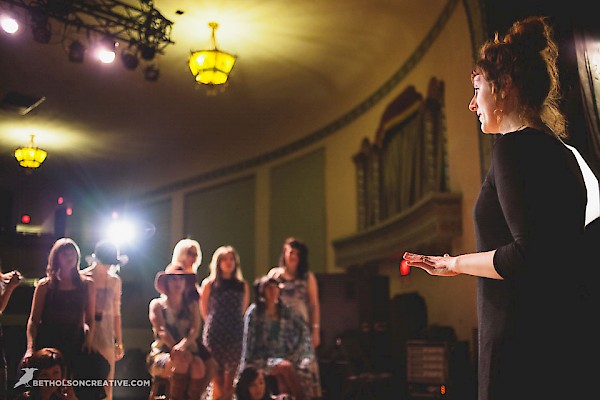 Altar's Cassie Ridgway conducts the show: Photo by Beth Olson
Altar's Cassie Ridgway conducts the show: Photo by Beth Olson
Ridgway was on hand to smooth fabrics, pose and arrange the models, instructing them on how to look at the camera, the image they were to project—revealing both the feminine and the fierce at once.
“Okay, show that you’re sweet and nice, and also: ‘Don’t fuck with me.’”
They laughed and steeled their expressions, the camera shutter clicked, and Ridgway gushed, “You all look fucking baller. Amazing.”
 Moorea Masa: Photo by Jason QuigleyLocal photographers Jason Quigley and Beth Olson, respectively, captured the action center stage as well as backstage behind the scenes at the three photo shoots, documenting the process and the rare occasion to pack so much local talent in one room.
Moorea Masa: Photo by Jason QuigleyLocal photographers Jason Quigley and Beth Olson, respectively, captured the action center stage as well as backstage behind the scenes at the three photo shoots, documenting the process and the rare occasion to pack so much local talent in one room.
“Every girl is such a babe,” Ridgway says softly, reflecting on the photoshoot at her shop. “Every shape, height, hair style, personal style, they all span such different elements. Some of the girls have radical colored hair, mohawks—but they’re all so confident that I was comfortable having them swap around clothing and add their own styling components. Hats, jewelry that they care about, makeup.”
Ridgway’s love of all things fine arts conveys her multidisciplinary background not only in music and performance, but in poetics, English literature and language. Those connections are made in her shop in a myriad of ways, particularly in this collection and it being fabricated with the artist in mind. Her experience as a female musician onstage informs the way she designs clothing, and vice versa.
“The two are inextricably linked,” she explains. “You have to look so great and you’re communicating that you care. You’re not just showing up—you care about what the audience’s experience is. With our band, Fault Lines, we make it a point to dress nicely, to come up with some continuity—this rad, uniformed look. Every show is important and every show is an opportunity to reach a new listener.”
“What we are doing is a form of activism.”
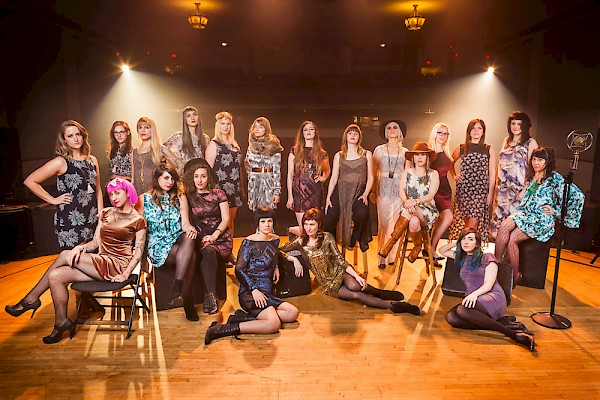 Back (standing): Allison Hall, Margaret Wehr, Grace Peters, Luz Elena Mendoza, Jeni Wren Stottrup, Kris Doty, Sara Jackson-Holman, Sarah Fennell, Jimi Hendrix, Amanda Spring, Shana Lindbeck, Emily Overstreet | Front (seated): Marisa Laurelle, Cristina Cano, Moorea Masa, Kelli Schaefer, Tai Carmen, Brookes Regenhardt, Jessica Boudreaux, Adrienne Hatkin-Seely: Photo by Jason Quigley
Back (standing): Allison Hall, Margaret Wehr, Grace Peters, Luz Elena Mendoza, Jeni Wren Stottrup, Kris Doty, Sara Jackson-Holman, Sarah Fennell, Jimi Hendrix, Amanda Spring, Shana Lindbeck, Emily Overstreet | Front (seated): Marisa Laurelle, Cristina Cano, Moorea Masa, Kelli Schaefer, Tai Carmen, Brookes Regenhardt, Jessica Boudreaux, Adrienne Hatkin-Seely: Photo by Jason Quigley
In keeping with the theme of multiplicity, this grand gathering of Portland women in music revealed not only rich and varied musical backgrounds, instruments and styles, but their agility and desire to balance several projects.
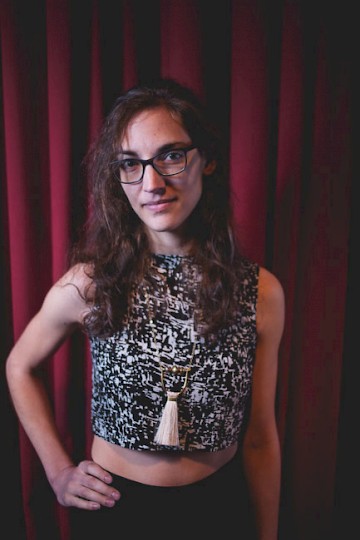 Margaret Wehr: Photo by Beth OlsonMargaret Wehr, a singer and classically trained violinist in Promise the Moon, also performs as a folk-guitar soloist. Wehr double-majored in music and women’s studies, striking a good balance as a female performer alongside her male counterparts.
Margaret Wehr: Photo by Beth OlsonMargaret Wehr, a singer and classically trained violinist in Promise the Moon, also performs as a folk-guitar soloist. Wehr double-majored in music and women’s studies, striking a good balance as a female performer alongside her male counterparts.
“As a woman, I’m always finding myself in bands with men and I have to ask myself, ‘How do I express my voice?’ I love to put something out there that makes people uncomfortable: speaking from my perspective, things that I experience, things that I observe, ways that other people treat me and view me. It can be a struggle to get people to listen and not just look at you and make a judgment,” Wehr explains. “I always want the female audience members to feel empowered by the things that I have to say but I also don’t want to alienate the male audience members.”
Moorea Masa, singer, guitarist and former frontwoman of The Ruby Pines, provides backup vocals in the classic soul band Ural Thomas & the Pain. For an expressive performer like Masa, stepping back from the spotlight might seem counterintuitive, but it has led to several opportunities for live performances and studio sessions, most recently recording two tracks with The Decemberists (“Till The Water’s All Long Gone” and “Carolina Low”) on their new album What a Terrible World, What a Beautiful World.
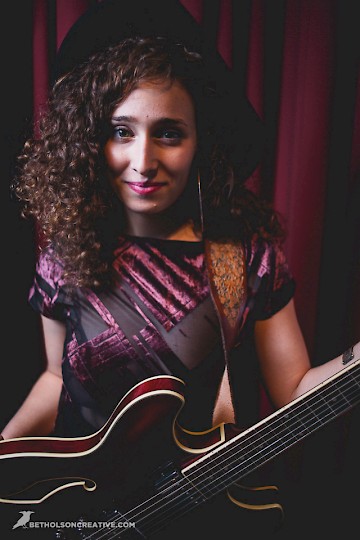 Moorea Masa: Photo by Beth Olson“When you’re in a band, you’re sharing the responsibilities and the center of it—even when I’m singing lead, I’m really sharing the writing with other people. But when it’s just you, it’s super vulnerable.” Masa likens the contrast—being part of large band versus solo work—to leading a double life.
Moorea Masa: Photo by Beth Olson“When you’re in a band, you’re sharing the responsibilities and the center of it—even when I’m singing lead, I’m really sharing the writing with other people. But when it’s just you, it’s super vulnerable.” Masa likens the contrast—being part of large band versus solo work—to leading a double life.
To soothe that solitary sensitivity, Masa recently joined forces with Wehr and Allison Hall (of Goose & Fox), who provide backing vocals on her new EP, Oh Mother, with beautiful three-part harmony results.
A classically trained pianist and vocalist, Sarah Fennell of Lost Lander is not unlike the other women in the Greenroom project, and putting all of this talent together in one room is bound to spark ideas and new collaborations.
“It’s so rad to be around all these ladies because, in my current band, I’m the only female and there’s a lot of dude energy, but they’re all very sensitive dudes. They’re trying to teach me about Ani DiFranco,” Fennell laughs and continues, “I don’t get it, I happened too late.”
“I really like doing more than one thing at a time. I was actually just talking to Amanda Spring [vocalist and drummer for Sallie Ford and Point Juncture, WA] about doing a new little project,” Fennell says. “Jamming with some friends, double percussion drums, synthesizers, singing... whatever happens. I miss all the female energy. I love my band—I’m so stoked about it, but it is nice to have another outlet too.”
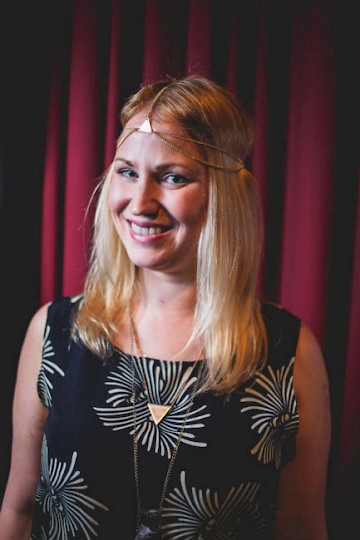 Jeni Wren Stottrup: Photo by Beth OlsonJeni Wren Stottrup, a singer and keyboardist who records under Jeni Wren, is enjoying similar creative time with the musicians in this community.
Jeni Wren Stottrup: Photo by Beth OlsonJeni Wren Stottrup, a singer and keyboardist who records under Jeni Wren, is enjoying similar creative time with the musicians in this community.
“Piano is something I’ve been playing since I was 5, so I’m starting to schedule these dates of being around a real piano, turning on the recorder, and just hanging out. It brings me back to some of the sessions I had when I was writing that first EP where I was getting together with friends and showing them the songs I had worked on,” Wren describes.
Wren, formerly of Shy Girls, has a background in political communication, making her equally adept at working behind the scenes producing shows and marketing. She founded the MUSA Soul Fest and recently joined the PDX Pop Now! team as the media sponsorship coordinator. As a successful organizer, performer, promoter and soon-to-be podcaster, Wren is taking the time to support other musicians in her efforts.
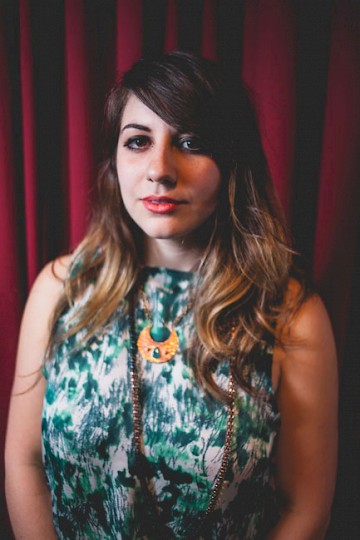 Cristina Cano: Photo by Beth OlsonLike Wren, Cristina Cano can attest to the boon of supporting several bands and multiple musical outlets. Cano plays keyboards for Sallie Ford and adds vocals and guitar in Albatross and Siren and the Sea. With Sallie Ford, Cano ventures into “these cool, crazy, psychedelic places—a kind of rock-and-roll thing that I’ve never really explored.” With Albatross, it’s also rock and roll “but I get to wail on it a little more, vocally,” Cano says with a smile. And for her own songwriting, the cerebral folk of Siren and the Sea, Cano describes it as “that heart thing—getting it out there, bleeding it out.” For her, being in multiple bands is instructive: “There’s a reason why you get drawn to other projects—you get to use those tools for your own stuff.”
Cristina Cano: Photo by Beth OlsonLike Wren, Cristina Cano can attest to the boon of supporting several bands and multiple musical outlets. Cano plays keyboards for Sallie Ford and adds vocals and guitar in Albatross and Siren and the Sea. With Sallie Ford, Cano ventures into “these cool, crazy, psychedelic places—a kind of rock-and-roll thing that I’ve never really explored.” With Albatross, it’s also rock and roll “but I get to wail on it a little more, vocally,” Cano says with a smile. And for her own songwriting, the cerebral folk of Siren and the Sea, Cano describes it as “that heart thing—getting it out there, bleeding it out.” For her, being in multiple bands is instructive: “There’s a reason why you get drawn to other projects—you get to use those tools for your own stuff.”
“There are women I’ve seen and known and met on the periphery, but as women we don’t always get to communicate our adoration for each other,” Cano explains. “It’s really neat to be in a room of 20 women and we’re all talking about, ‘How’s your music going?’ We’re not talking about dudes or babies, it’s more, ‘I’m so excited that my album’s coming out!’ And not feeling ashamed for wanting to look pretty.”
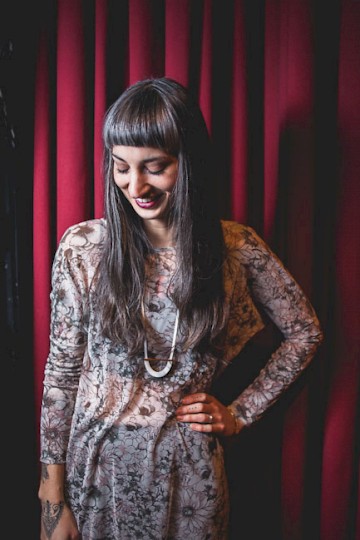 Luz Elena Mendoza: Photo by Beth OlsonBut the women of Portland music aren’t just pretty faces—they are fierce representatives of gender, culture, art and politics. Luz Elena Mendoza leverages her voice locally and across international borders for causes that are important to who she is and where she lives.
Luz Elena Mendoza: Photo by Beth OlsonBut the women of Portland music aren’t just pretty faces—they are fierce representatives of gender, culture, art and politics. Luz Elena Mendoza leverages her voice locally and across international borders for causes that are important to who she is and where she lives.
Mendoza, a singer-songwriter at the core of Y La Bamba and Tiburones, has been playing music in Portland for eight years with bands both inside and outside of the city and state. She’s explored her own Mexican heritage in several projects including her appearance on Sergio Mendoza Y La Orkesta’s Alarma with “Mi Sangre Es Tu Ventana,” and Shawn King, the noted civil rights activist from DeVotchKa, on a track (listen below) for a traveling exhibition of live music, visual art and stories about immigration and American identity called Dreaming Sin Fronteras. This winter, she’s recording another Y La Bamba album with some new collaborators and looking forward to a summer release.
“The Portland music scene is awesome—it’s thriving—but we all just have to remember: There’s a reason why we’re all here, why what we have is so powerful. It’s a responsibility that we have to share with the audience—a healing through what is happening that we can’t deny, and we must come together in that way,” Mendoza explains. “I really feel that right now and I really want to see more of that in Portland, more of that in every single girl here, and everyone else that I really respect and admire. With music, because we have this gift, we have to do that. That is our job.”
Mendoza’s faith in the strength of Portland’s music scene is also a call to action—to find musical ways to navigate our current social issues and to foster community support. This sentiment is echoed by Ridgway and her enthusiasm shines through.
“I believe that what we are doing is a form of activism because supporting independent manufacturers is not only cool and edgy—it is what must be done. Designer-manufactured production in our city is the high tide raising all ships.” Ridgway’s small-batch, locally made modus operandi keeps Altar affordable, accessible and sustainable.
“I’m pretty blue collar about this whole thing,” Ridgway asserts. And she lives by her word. During the day she dreams up designs and runs her shop, and by night, she waits tables—there’s no fashionista attitude that accompanies her work in either realm. Somewhere, somehow, Ridgway also manages to wedge time in for music. That crosses over into the way that she and her fellow women rock stars dress for work, especially when the workplace is the bright, hot stage where all eyes and ears are focused on them.
“I love making stagewear—dresses that are fun, simple and comfortable but also have this presence to them. For me as a musician, that’s the most awesome thing you can get—this rad-looking dress that’s really striking and makes a statement, but you can sling your guitar over it and you’re comfortable.”
“I felt like I found an island of my kin! We are our own breed, lady music-makers, aren’t we? A colorful, vibrant, wonderful clan.” —Tai Carmen
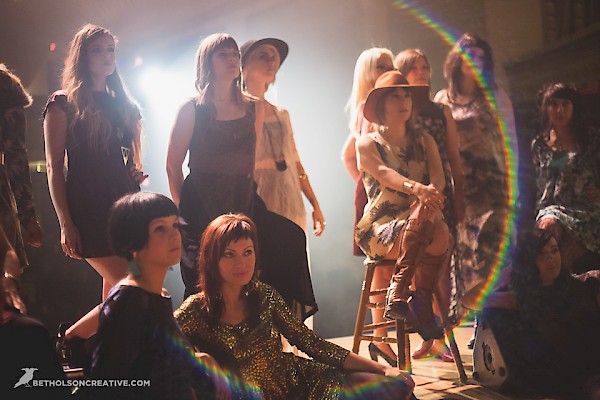 Carmen seated center in the gold shift dress flanked by Kelli Schaefer left and Brookes Regenhardt and Jessica Boudreaux (Summer Cannibals) right, with Sara Jackson-Holman, Sarah Fennell (Lost Lander) and Jimi Hendrix (Thanks) behind: Photo by Beth Olson
Carmen seated center in the gold shift dress flanked by Kelli Schaefer left and Brookes Regenhardt and Jessica Boudreaux (Summer Cannibals) right, with Sara Jackson-Holman, Sarah Fennell (Lost Lander) and Jimi Hendrix (Thanks) behind: Photo by Beth Olson
The stage is like an altar. It’s an elevated structure meant for offering and honoring—a place to worship the muses and the divine spark within and around us. One prepares the sacred space for ritual—whether it be prayer, meditation or song—and once it begins, we all take part in the ceremony, the celebration and the opportunity for transcendence. In building their Altar, Ridgway and Fox find inspirational muses in their female musicians and friends. It’s what The Greenroom Collection lookbook is all about—thoughtful designs and jewelry imbued with meaning that honor and adorn the feminine mystique brought to the stage.
Altar’s curated selection of local apparel, accessory designers, and hand-crafted apothecary lines play with esoteric and organic themes, as evidenced by maker names like Cobra Cult, Wolf Child, Foxtail, Deer Dog, and Midnight Collective. The collections are accented by the magical and natural world symbology of serpents, skulls, feathers, flowers, all-seeing eyes, daggers, Egyptian and alchemical marks, majestic beasts, starry skies, and tarot and palmistry maps. Fox’s jewelry combines raw quartz and amethyst crystals with steel, gunmetal and hammered brass for High Priestess earrings, pendants and Lunar Shields—rings and necklaces stamped with a crescent moon, terminating in an inverted triangle (or Yoni Yantra), a symbol of the Goddess Shakti (the Great Divine Mother) and the representation of female sexuality and creativity. Together, Ridgway and Fox are aiming for an elegant sense of mysticism and naturalism.
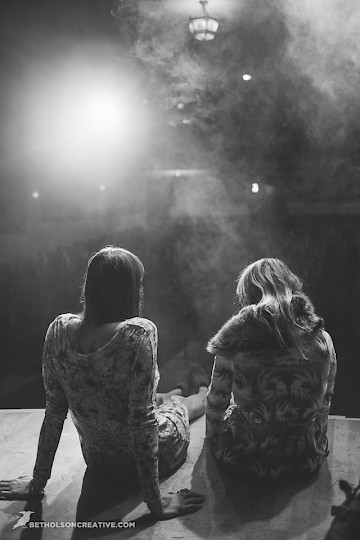 Luz Elena Mendoza and Kris Doty of Modern Kin: Photo by Beth OlsonFor Ridgway, being a leader in a band is not unlike running a small business and she acknowledges the profound and personal ways that music and fashion have shaped her as a business owner, especially in her level of confidence.
Luz Elena Mendoza and Kris Doty of Modern Kin: Photo by Beth OlsonFor Ridgway, being a leader in a band is not unlike running a small business and she acknowledges the profound and personal ways that music and fashion have shaped her as a business owner, especially in her level of confidence.
“I was 22 when I opened this store. I was a very young entrepreneur with very big ideas and no money, so I’ve had to be really convincing. I get on my soapbox all the time and I think that some level of that—the theatrics of it, the actual selling it, making people understand it in a way that they can get inspired by—really comes from what I have learned as a performer.”
What Ridgway has learned so far about her design work can be applied to the music industry, or any artistic endeavor for that matter.
“It’s going to be whatever you make of it. That has been eye-opening to me and I really love seeing how versatile it is.”
As versatile as the women of Portland music.

